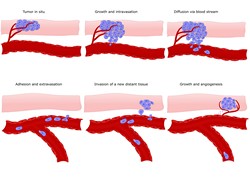Novel anti-angiogenic targets
The growth of solid tumours relies on the supply of nutrients by newly developed blood vessels. Although angiogenesis is a physiological process, the mechanism by which tumours sprout new vessels is poorly understood. Inhibition of angiogenesis represents an actively pursued strategy to treat human cancers. However, current anti-angiogenic therapies lead to resistance and upregulation of additional angiogenesis factors. Apelin is a peptide that plays several roles in the human body, including roles in the vascular system and in the initiation of angiogenesis. It is a potent angiogenic factor and is frequently upregulated in cancer. To delineate its role in cancer, the EU-funded APELIN THERAPY (Apelin inhibition as an anti-cancer therapy) project utilised mouse model systems of spontaneous cancer where the apelin gene was knocked out. Researchers followed a multi-disciplinary approach, including non-invasive magnetic resonance imaging and transcriptome analysis, to analyse the impact of the lack of apelin. They complemented basic science data with clinical data, and provided new insights into the functional role of apelin in angiogenesis. Overall, their findings underscored the functional role of apelin in angiogenesis and its usefulness as a cancer target. Considering the limitations of existing anti-angiogenesis therapies, apelin inhibition could be used for the treatment of unresponsive cancer cases and to complement existing anti-cancer therapies.







